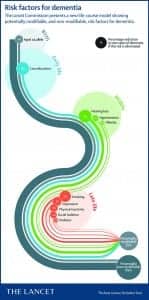Research | August 2018 Hearing Review
Revisiting the 2017 report that includes hearing loss as a major risk factor for dementia
A major review1 first published in the July 19, 2017 online edition of The Lancet identified nine modifiable high-risk factors linked to dementia. Of these nine, the highest risk factor was found to be mid-life hearing loss (Figure 1). The nine factors are:
- Hearing loss,
- Low level of education,
- Physical inactivity,
- Hypertension,
- Type 2 diabetes,
- Obesity,
- Smoking,
- Depression, and
- Social isolation.
These factors, which are generally lifestyle issues and modifiable, account for about 35% of the overall risk of dementia. Aging and family history are more significant (but not modifiable) factors.
The review pointed out that not only is hearing loss the highest of these nine risk factors, it is also an important factor because of its prevalence, occurring in about 32% of individuals older than 55 years. According to the report:
Hearing loss might either add to the cognitive load or lead to social disengagement or depression, all of which could contribute to accelerated cognitive decline.
The 100-page review was developed by the Lancet Commission on Dementia Prevention. The panel of more than 20 physicians and researchers reviewed and evaluated the available research, and provided evidence-based recommendations for preventing, treating, and managing dementia.
The Commission described dementia as the greatest global challenge for health and social care in the 21st century. The global cost in 2015 was estimated at more than $800 billion. Most of this cost is attributed to family and social costs rather than medical care. The number of dementia patients is expected to tripleby 2050 due to an increasing population and increasing longevity.
Controlled studies of the effect of hearing aid use on the risk of dementia are not available. A large retrospective study by Hélène Amieva, PhD, of the University of Bordeaux and her colleagues2 did find that the group that used hearing aids did not experience the cognitive decline that the non-hearing aid group did. However, this was not a controlled study, and it may be that adults who choose to use hearing aids differ in other ways than those who do not.
There is increasing evidence that hearing loss has far greater effects than sensory impairment. In addition to an increased risk for dementia, adults with untreated hearing loss report greater stress, increased social isolation and poorer family relationships, including spousal relationships. Identification and treatment are important steps in modifying the negative effects of untreated hearing loss.
More research needs to be conducted to understand hearing loss and its association with cognitive decline and dementia. In my opinion, it is important for all hearing care professionals to familiarize themselves with what is now becoming ubiquitously referred to in hearing healthcare as “The Lancet Report.”
Acknowledgement
This article was adapted from a news item that appeared in the author’s newsletter for physicians and other healthcare professionals, Audiology HealthCare News.
READ the The Lancet report and view the above infographic at: https://bit.ly/2zPv6FO
Correspondence can be addressed to Dr Hampton at: [email protected]
Citation for this article: Hampton D. Nine risk factors associated with dementia. Hearing Review. 2018;25(8):22.
References
-
Livingston G, Sommerlad A, Orgeta V, et al. Dementia prevention, intervention, and care. Lancet.2017;390(10113):2673-2734.
-
Amieva H, Ouvrard C, Giulioli C, Meillon C, Rullier L, Dartigues J-F. Self-reported hearing loss, hearing aids, and cognitive decline in elderly adults: A 25-year study. J Am Geriatr Soc. 2015;63(10):2099-2104.







